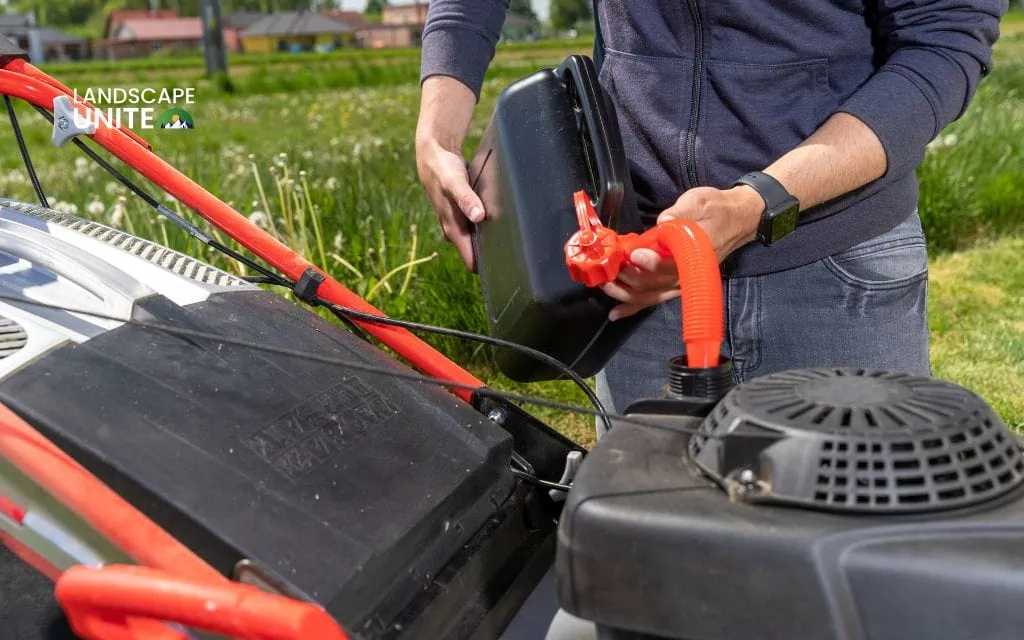Picture this: you’re about to tackle weekend lawn care, and you discover your mower is low on oil. Your garage has plenty of car engine oil sitting on the shelf, but you’re wondering – can you use car engine oil in a lawn mower without damaging your equipment?
The straightforward answer is yes, you can use car oil in most lawn mowers, but there are crucial exceptions and considerations that could save you from costly repairs down the road.
Looking for more lawn mower maintenance guides? Check out the articles below:
- Can you jump-start a lawn mower with a car battery? Expert explanation
- How sharp should lawn mower blades be? Complete maintenance guide
- How to make your lawn mower run faster: 6 practical tips
- How to winterize a lawn mower: 7 expert steps for proper care
- 10 smart ways to store your lawn mower in the garage
Can you use car engine oil in your lawn mower?
Yes. Car oil works in 4-stroke lawn mowers when it matches your manufacturer’s viscosity specifications. Common automotive oils like SAE 30 or 10W-30 can effectively lubricate most residential mower engines without immediate harm.
However, this compatibility comes with significant limitations:
- Never use car oil in 2-stroke engines: These require special oil-to-gas mixtures
- Long-term use may cause issues including increased deposits, faster wear, and reduced engine life
- Not all car oils are created equal: Quality and additive packages matter significantly
Bottom line: Car oil serves as an acceptable temporary solution for 4-stroke mowers, but dedicated small engine oils offer superior long-term protection.

Understanding engine oil fundamentals
What makes engine oil different
Engine oils contain base oils combined with additive packages that provide lubrication, cleaning, and protection. However, the specific formulations vary dramatically between automotive and small engine applications.
The key difference lies in the operating environment. Car engines run at relatively consistent temperatures with sophisticated cooling systems, while lawn mower engines operate in extreme conditions with basic air cooling systems.
Viscosity grades explained (SAE 30 vs 10W-30)
Viscosity grades determine how oil flows at different temperatures. SAE 30 is a single-grade oil that maintains consistent thickness, while 10W-30 is multi-grade, flowing like 10-weight oil when cold and 30-weight when hot.
Most modern lawn mowers can use either grade, but 10W-30 offers better versatility across temperature ranges. This makes it suitable for year-round use, providing good cold-start protection and high-temperature performance.
API certification requirements
The American Petroleum Institute (API) sets standards for oil quality and performance. Both automotive and small engine oils must meet specific API certification requirements, but the testing criteria differ significantly.
Small engine oil specifications focus on thermal stability and oxidation resistance, while automotive oils emphasize fuel economy and emission system compatibility.

Key differences between car oil and lawn mower oil
Additive packages and formulation
Car engines operate at highway speeds with sophisticated cooling systems and oil filters. Automotive oils contain detergents, friction modifiers, and dispersants designed for these high-stress conditions.
Lawn mower engines run at lower RPMs and temperatures without oil filtration systems. The additives that benefit car engines can actually create problems in small engines, including:
- Excessive foaming from friction modifiers
- Deposit buildup from incompatible detergent packages
- Seal degradation from aggressive cleaning agents
Viscosity considerations for small engines
Most small engines perform best with single-grade oils like SAE 30, which maintain consistent thickness across operating temperatures. While multi-grade automotive oils (5W-30, 10W-30) can work, they may:
- Burn off faster in air-cooled engines
- Provide inconsistent lubrication during temperature fluctuations
- Increase oil consumption in warmer climates
Engine design differences
Unlike automobiles, lawn mowers lack sophisticated oil filtration. This design difference means:
- Contaminants accumulate faster in the oil
- Clean oil becomes critical for engine longevity
Specialized formulations help manage debris and combustion by-products.
When it’s safe to use car oil in your lawn mower
For 4-stroke engines (most modern mowers)
Check your owner’s manual first. Manufacturers typically specify acceptable viscosity ranges. Most 4-stroke mowers from brands like Honda, Toro, and Craftsman can run on high-quality automotive oil meeting these criteria:
- API service rating of SJ or higher
- Correct viscosity (usually SAE 30 or 10W-30)
- Fresh, unused oil only
Popular 4-stroke mowers that often accept car oil include walk-behind push mowers, self-propelled models, and riding mowers with single-cylinder engines.
Situations to avoid car oil
2-stroke engines require specialized oil that burns cleanly when mixed with gasoline. Using car oil in 2-stroke equipment like string trimmers, leaf blowers, or older mowers results in:
- Excessive smoke production
- Carbon buildup in combustion chambers
- Potential engine seizure from inadequate lubrication
Older or smaller engines may also be more sensitive to automotive oil formulations, making dedicated small engine oil the safer choice.

Best oil types for lawn mower engines
SAE 30: The traditional choice
- Best for: Warm climates and standard push mowers
- Advantages: Stable viscosity, widely available, cost-effective
- Drawbacks: Thickens significantly in cold weather, making spring startups difficult
SAE 10W-30: All-season versatility
- Best for: Variable climates and riding mowers
- Advantages: Improved cold-weather starting, good temperature stability
- Drawbacks: May increase oil consumption in extreme heat
Synthetic SAE 5W-30: Premium protection
- Best for: High-performance or commercial equipment
- Advantages: Superior temperature stability, extended drain intervals, excellent cold-start protection
- Drawbacks: Higher upfront cost
2-stroke engine oil: Specialized formula
- Best for: Mixed-fuel engines in trimmers and blowers
- Advantages: Burns cleanly, prevents carbon buildup, designed for air-cooled operation
- Drawbacks: Cannot be used in 4-stroke engines
Expert tips for using car oil safely
Follow manufacturer guidelines
Always consult your owner’s manual before substituting car oil. Manufacturers specify viscosity ranges and performance standards for good reason – deviating from these recommendations may void warranties.
Use only fresh oil
Never use recycled automotive oil in your mower. Used car oil contains contaminants, metal particles, and degraded additives that can damage small engines rapidly.
Maintain regular change intervals
Small engines accumulate debris faster than automotive engines. Change oil every 25-50 operating hours or at least once per season, regardless of oil type.
Monitor oil condition closely
Check oil level and color before each use. Milky oil indicates water contamination, while black oil suggests overheating or extended use. Either condition requires immediate oil change and potential engine inspection.
Consider synthetic for long-term value
While synthetic oils cost more initially, they often provide better protection under heat stress and extended service intervals, potentially offering better value for frequent users.

Common mistakes that damage engines
- Using car oil in 2-stroke engines tops the list of costly errors. This mistake can destroy equipment within hours of operation.
- Overfilling the crankcase with any oil type causes foaming, reduced lubrication, and potential seal damage. Always fill to the “full” mark, never above.
- Mixing different oil types creates unpredictable chemical reactions. Stick with one oil type and brand when possible.
- Ignoring change schedules leads to oil breakdown and engine wear, regardless of whether you use car oil or specialized small engine oil.
- Using low-quality oils to save money often costs more in long-term repairs and reduced equipment life.
Best practices for oil selection
Reading your owner’s manual
Your owner’s manual contains the most important information for oil selection. Look for the recommended viscosity grade, API service classification, and any specific brand recommendations.
Don’t ignore the fine print about operating conditions. Some manuals specify different oils for commercial use, dusty conditions, or extreme temperatures.
Climate and usage factors
Consider your local climate and how you use your mower. Hot climates and heavy-duty use favor specialized small engine oils, while moderate conditions and light use make automotive oil more acceptable.
Dust and debris exposure also matters. If you mow in dusty conditions, you’ll need more frequent oil changes regardless of oil type, and small engine oils typically handle contamination better.
Quality vs. cost considerations
Premium small engine oils cost 20-30% more than automotive oils but provide superior protection under extreme conditions. This extra cost often pays for itself through reduced maintenance and longer engine life.
However, if you’re budget-conscious and your mower operates under moderate conditions, quality automotive oil meeting manufacturer specifications can be a reasonable compromise.
Equipment maintenance best practices
Regular oil changes remain the most important maintenance task regardless of oil type. Follow your manufacturer’s recommended oil change frequency, typically every 50 hours or annually for residential use. Check oil levels before each use, especially during hot weather when consumption increases. Low oil levels can cause catastrophic engine damage in minutes.
Conclusion
Can you use car engine oil in a lawn mower? Absolutely – but understanding when and how makes the difference between a quick fix and potential engine damage.
For occasional use in 4-stroke mowers, quality automotive oil meeting manufacturer specifications works acceptably. However, dedicated small engine oils provide superior protection designed specifically for the unique demands of lawn mower operation. Remember, the best oil for your lawn mower is the one that meets manufacturer specifications, gets changed regularly, and keeps your equipment running smoothly season after season.
Discover more lawn care insights and maintenance tips at Landscape Unite. We’re your trusted resource for creating and maintaining beautiful outdoor spaces, providing practical solutions for homeowners and professionals alike.
Frequently asked questions (FAQs)
Will using car oil void my lawn mower warranty?
Most manufacturers allow automotive oil that meets their viscosity and API certification requirements, but always verify your specific warranty terms to avoid potential issues.
How often should I change oil when using car oil in my mower?
Follow the same schedule as specialized oil: Every 50 hours or annually for most engines, with more frequent changes in dusty conditions or heavy use.
Can I mix car oil with existing lawn mower oil?
Yes, oils of the same viscosity grade can typically be mixed safely, but completely draining and refilling provides optimal performance and protection.
What’s the best viscosity for year-round use?
10W-30 offers the best versatility for most climates, providing good cold-start protection and high-temperature performance across seasonal temperature ranges.
Are synthetic car oils better than conventional mower oils?
High-quality synthetic oils generally provide superior protection, but ensure they meet your engine’s specifications and don’t contain friction modifiers that could affect equipment.


